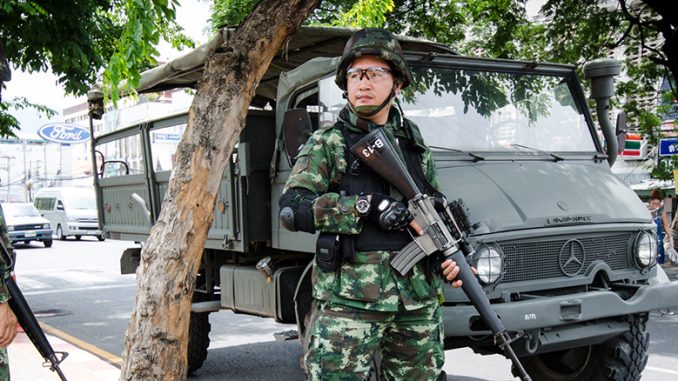
“There are military coups, but there are also military governments and political parties which have come out of the womb of the army.” 1
As Thailand approaches the end of 2021, its limited democracy, manipulated by autocratic institutions, is becoming increasingly entrenched. The abiding power of despots has paralleled an absence of authority by elected civilians. Indeed, unless they are weak and non-threatening, elected governments have been blithely detested by Thailand’s monarchy and military. Liberal democracy has been the enemy of these two institutions because it challenges their monopoly over Thai politics. That is why the civilian-led administrations of Thawan Thamrongnawasawat, Khuang Apaiwong, MR Seni Pramoj, Chatchai Chunhavan, Chavalit Yongchaiyudh, Thaksin Shinawatra, Somchai Wongsawat and Niwatthamrong Boonsongpaisan were forced from office either through military coup and/or monarchical manipulation in 1947, 1948, 1976, 1991, 1997, 2006, 2008 and 2014 respectively. Since 1932, Thailand has experienced 14 overt military coups. These interventions have generally happened in the form of palace endorsed “veto coups” following electoral victories by political parties representing groups which the military abhors or directed against already sitting governments which begin to promote policies which the military opposes. 2
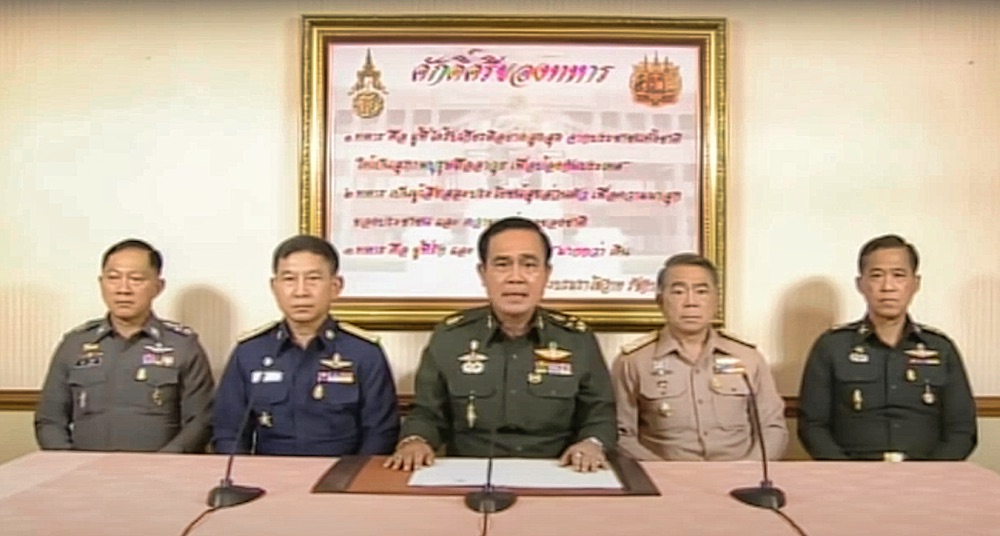
With such interference from the country’s “khakistocracy” (military + monarchy), it is no small wonder that democratization in Thailand has been lost in transition. Thailand today is thus a praetorian state where “the military tends to intervene and could potentially dominate the political system,” 3 though its power is conditioned by royal preferences. The only alternative has been to take to the street, and that is what Thailand’s young protestors have been doing since early 2020. Ideally, political parties are the supposed bedrocks of civilian-led representative democracy. But where autocrats assert veto powers over democracy (usually seeking to conceal their interference), this is nothing new and happens throughout the world. Merkel (2004) calls this phenomenon “domain” or “tutelary democracy; 4 Loveman, writing about military domination, refers to it as “protected democracy” 5 and with regard to Thailand’s royalist-guided political system, Thongchai uses the term “royalist democracy. 6 Appearing to support democracy, no matter how limited the attempt, offers Thailand’s palace and military some added popular legitimacy. As part of that effort, the military has, across time, attempted to construct proxy political parties—Trojan Horses concealing military domination—through which to administer the country.
Thailand’s earliest electorally competitive parties were those of civilian politicians participating in the 1946 election. Nevertheless, this democratic experience was snuffed out by a 1947 coup and the arch-royalist Prachatipat was the only party to linger on. The post-1947 military coup group of Gens. Phibun Songkram, Phin Chunhavan, Phao Sriyanon and Sarit Thanarat permitted three elections to take place in 1948, 1952 and 1957 as a method to whitewash their stranglehold on power. But the 1957 election was different because it represented the first time that the military built a political proxy party—competing with other parties to win an election—though the poll outcome was rigged. 7 In fact, the military had prepared for this election since 1955, when Prime Minister Gen. Phibun Songkram created the Seri Manangkhasila party (SMP) in September of that year. SMP was the first party in Thai history legally registered–under Phibun’s Political Parties Act of 1955. SMP was useful as an attempt to enhance Phibun’s own power with the people vis-à-vis the military. But SMP also represented an effort to hierarchically consolidate Phibun’s associates Army Commander Sarit Thanarat (Party Deputy Leader) and Police Chief Phao Sriyanond (Party Secretary General) under him. SMP became the model for all future military political parties. As in 2021, thousands protested against the February 1957 election irregularities and Phibun was compelled martial law to restore order.
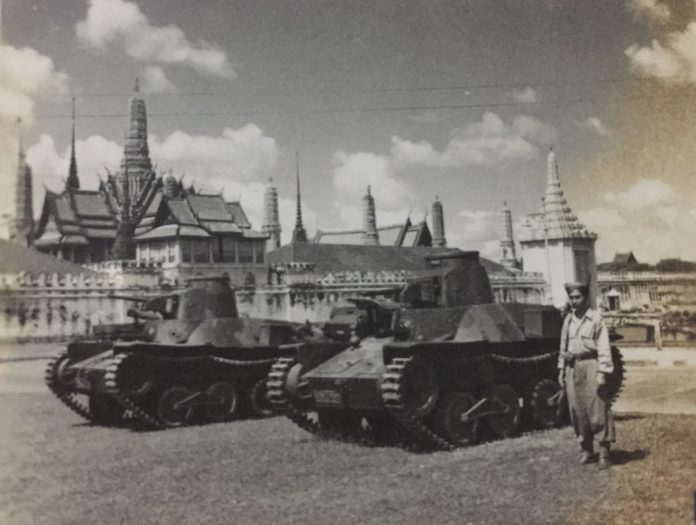
The utter failure of Phibun’s SMP in that poll should have turned the Thai military against political parties. But it did not because parties were too useful a model for consolidating military power over civilians. In September 1957 Sarit staged a coup against Phibun and established his own personalized regime. Three months earlier, his military faction had established Sahaphum in an unsuccessful attempt to oust Phibun through a vote of no confidence. But in December the regime held another multi-party election in which Sahaphum was the winner. Thereupon he merged Sahaphum into his new Chart Neeyom Sangkom, amalgamating his military and civilian followers within it. Despite a generally positive experience with party politics, Sarit instituted a direct tyranny in 1958.
Thailand’s next experience with a political party also came from the military—this time under the regime of Sarit’s successor’s Gens. Thanom Kittikachorn and Praphas Charusatien. Pressures for a move toward creation of a military proxy party originally derived from the United States. In 1965, the US Embassy sent a cable to Washington proposing:
to promote and organize a government political party under the leadership and control of the present ruling group. A corollary objective is to attempt to ensure that the party created is successful in winning a comfortable and commanding majority in elections. 8
This effort became known as Operation Lotus. It was operationalized in the 1969 election, in which junta proxy party SahaPrachaThai, with military dictators Gens. Thanom and Praphas as party leader and deputy leader respectively, was victorious. Unelected dictator Thanom was thus “elected” as Premier. But though the new system helped the tyranny to acquire popular support to sustain its rule, the elected Lower House became “inefficient” to the junta leaders. They staged a coup against their own regime in 1971, returning to direct dictatorship.
During Thailand’s 1973-1976 interregnum of civilian rule, military generals remained involved in party politics, though more obliquely. Army Commander Gen. Krit Sivara reportedly controlled 100 MPs in at least two parties—Sarit’s Chart Neeyom Sangkom and Kaset Sangkom Meanwhile, retired Generals Pramarn Adireksan and Chatchai Chunhavan competed via their new Chart Thai. But the palace-fomented 1976 coup prematurely ended this brief democracy. Then, another 1977 coup produced another junta—led by Gen. Kriangsak Chomanan, who held multi-party elections in 1979. The Prime Minister himself would remain an appointed official, selected by the Lower House and appointed Senate (he did indirectly funnel money into at least three parties). Ultimately, Kriangsak was a moderate, semi-reformist ex-military Prime Minister. However, royal opposition to Kriangsak forced him from office, facilitating the rise of arch-royalist Gen. Prem Tinsulanond in 1980.
Throughout his eight years as unelected military Prime Minister, Prem did not utilize a military proxy party to sustain his power. Thus, following Kriangsak’s example, he was an unelected Prime Minister who ruled alongside coalition parties, legitimizing his regime through its close support from the palace. The era was a dream-come-true for monarchy and the military. During 1980-1988, the king was never challenged by the Prime Minister, the Prime Minister was beholden to the monarch and the Senate was appointed by the military.
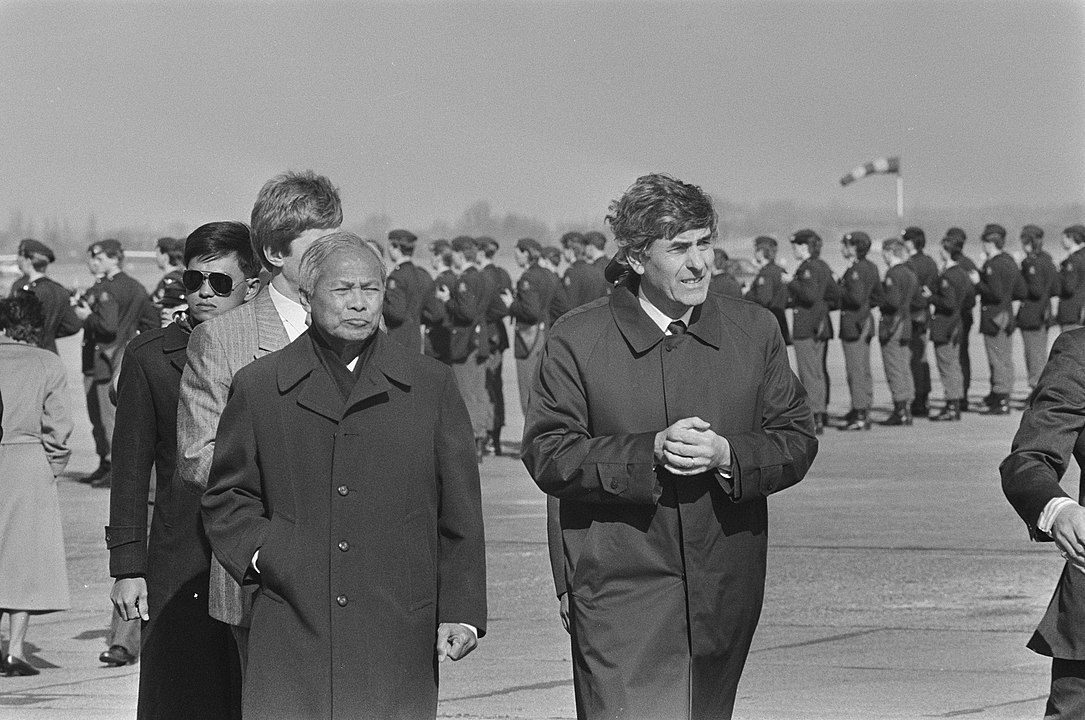
It couldn’t last. Amidst a public outcry for renewed democracy, retired elected Gen. Chatchai Chunhavan was allowed to take office in 1988. However, as his policies appeared to encroach upon their affairs, neither the palace nor the military could tolerate his continuation in office. The 1991 coup against him led to the creation of a new military-dominated political party Sammakhitam—in the tradition of the earlier SahaPrachaThai. As with the previous proxies, this one sought to appease a public wishing for pluralism while divvying up party roles and spoils to senior military officers. Nor did Sammakhitam last. When Army Commander Gen. Suchinda Kraprayoon assumed the premiership, demonstrations erupted, soldiers fired into crowds, and the military’s image was tainted. The king reluctantly dismissed Suchinda from office.
The periods 1992-2006 and 2008-2014 represented efforts in which the palace completely dominated Thailand, alongside the Privy Council, as led by Gen. Prem. This was a period of guided democracy or “royalist democracy.” With the military playing a clear auxiliary role to the palace, there were few attempts to create military proxy parties. There were a couple of exceptions to this during the 2007 election, but those parties were small. Though initial preparations to create a military proxy party began shortly after the coup in 2014, only following the 2016 death of King Bhumipol did the military begin in earnest to make plans for building a hegemonic political party.
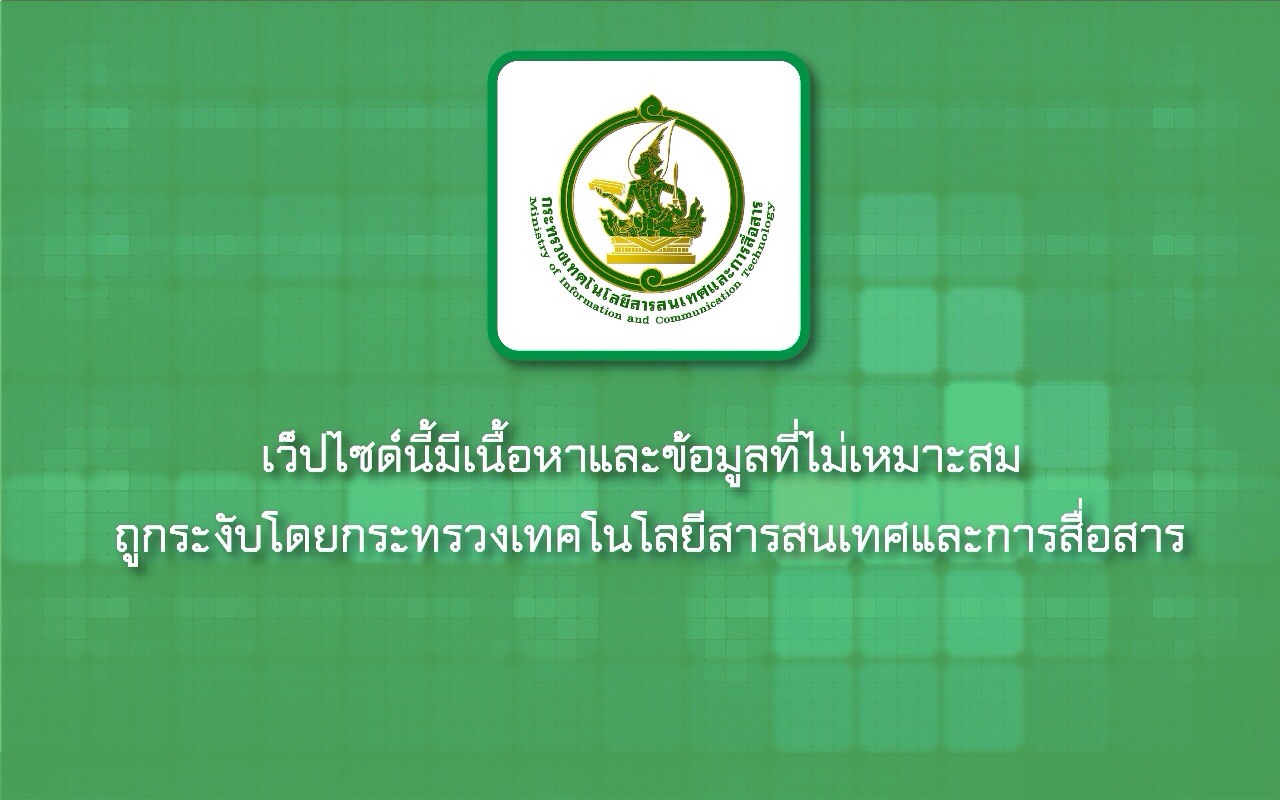
In 2015, the junta began delivering Pracha Rat (state populism) to villages across provincial Thailand with the military’s Internal Security Operations Command (ISOC) coordinating these projects. In 2017, junta leader Prayuth decreed the establishment of an ISOC Internal Security Superboard alongside accompanying seed money to fulfill the “security objective” of creating a junta party to win the next election. 9 Funding also came from faction leaders and deep-pocket investors (e.g. Charoen Phokphand, ThaiBev, Red Bull, Boonrawd, and Central). MP-led factions which had existed in other parties were induced to support Prayuth as Prime Minister. Ultimately, in 2019, Palang Pracharat was officially formed by ISOC-connected Colonel Suchart Jantarachotikul, Prayuth’s pre-cadet academy classmate. Its investments paid off and Palang Pracharat was elected in a 2019 poll. The junta’s 2017 constitution had given the junta’ party several advantages over other parties. Palang Pracharat is the latest military attempt to install a hegemonic party across Thailand. In 2021, Palang Pracharat’s leadership—like the 2014-2019 junta—is dominated by retired military officials. Gen. Prawit Wongsuwan is the party leader, Captain Thamanat Prompow is the Secretary-General and Gen. Wit Devahastin na Ayudhya is chair of PPRP’s strategic committee.
The party represents the extension of power via the façade democracy of Generals Prayuth (Prime Minister and Defense Minister), Prawit Wongsuwan (Deputy Prime Minister) and Anupong Paochinda (Interior Minister). Recent internal party disputes pitting Prayuth and Anupong on one side versus Prawit and Thammanat on the other are only part of Thailand’s new military-influenced party politics. The party will likely stay together and contest the next general election—to be held in 2022 or 2023—though it is possible that Prayuth and Prawit will separate to form their own military faction parties. The difference between Palang Pracharat and proxy military parties of the past is that today senior Thai military leaders have gone to more enormous lengths to woo voters with welfare policies—in addition to the usual tricks (e.g. gerrymandering, vote-buying) of previous military regimes. Another difference is that King Maha Vajiralongkorn appears to be going along with supporting the sustained military consolidation of power through a hegemonic political party.
Palang Pracharat is no anomaly for Thailand. In fact, this essay has only recounted the most relevant of Thailand’s military-dominated political parties. There are more. But with democratization in Thailand frozen under the overriding dominance of monarchy and military, civilian parties have tended to be weak and/or fleeting in existence. It is thus ironic that the armed forces have been the most powerful actor supporting the institutionalization of political parties—though in a decidedly corrosive manner. There urgently needs to be more unity in Thailand among all classes and groups to vigorously support demonstrations against the “Trojan Horse” of continuing Thai military rule called Palang Pracharat as an arm of the palace. If there is not, then autocracy will persist unabated.
Paul Chambers
Dr. Paul Chambers (pwchambers@gmail.com) is Lecturer and Special Advisor on International Affairs at the Center of ASEAN Community Studies, Faculty of Social Sciences, Naresuan University (Thailand). He is a Fellow at the Peace Research Institute Frankfurt, the German-Southeast Asian Center of Excellence for Public Policy and Good Governance and the Cambodian Institute for Cooperation and Peace. He is also the executive editor of the Routledge (Scopus) journal Asian Affairs: An American Review. Paul has authored or co-authored numerous journal articles, book chapters and six books. Recent publications include his co-edited book Khaki Capital: The Political Economy of the Military in Southeast Asia (NIAS, 2017). His research centers upon civil-military relations and democratization in Southeast Asia with a particular focus on Thailand.
Banner Image: May 2014. Thai military at Chang Phueak Gate in Chiang Mai. The two ladies at the right hand side of the image are bringing the contingent of soldiers stationed at Chang Phueak Gate lunch. Photo: Takeaway, Wikipedia Commons
Notes:
- Samuel Huntington, Political Order in Changing Societies, New Haven, Connecticut: Yale University Press, 1968, p.239. ↩
- Ibid., pp.223-224. ↩
- Amos Perlmutter, “The Praetorian State and the Praetorian Army: Toward a Taxonomy of Civil-Military Relations in Developing Polities,” in: Comparative Politics 1:3 (1969) p. 383. ↩
- Wolfgang Merkel, “Embedded and Defective Democracies,” Democratization, Vol.11, No.5, December 2004, DOI:10.1080=13510340412331304598, pp.49-51. ↩
- Brian Loveman, “Protected Democracies” and Military Guardianship: Political Transitions in Latin America, 1978-1993,” Journal of Interamerican Studies and World Affairs, Vol. 36, No. 2 (Summer, 1994), pp. 111-112. ↩
- Thongchai Winichinakul, “Thailand’s Hyper-Royalism: Its Past Success and Present Predicament,” Trends in Southeast Asia, Singapore: ISEAS, 2016 no.7, pp.1-2. ↩
- David A. Wilson and Herbert P. Phillips, “Elections and Parties in Thailand, Far Eastern Survey, Vol. 27, No. 8 (Aug., 1958), Institute of Pacific Relations, https://doi.org/10.2307/3024404: 113-119. ↩
- United States State Department, 303. “Memorandum Prepared for the 303 Committee,” September 28, 1965, https://history.state.gov/historicaldocuments/frus1964-68v27/d305. ↩
- Anonymous personal interview with retired National Security Council official and Army officer, 24 December 2020. ↩
